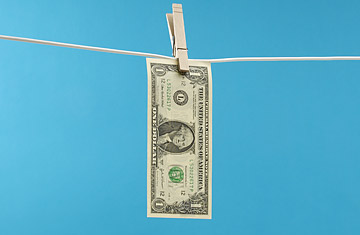
I got an unexpected lesson in the power of the U.S. dollar during a visit to Tashkent, the dreary capital of Uzbekistan, several years back. While heading into town from the airport, my babbling taxi driver kept one hand (barely) on the steering wheel while his other shoved a stack of local currency, the som, into my face. He insistently urged me to trade the money for dollars. After checking in at the grim Hotel Uzbekistan, a nattily clad porter showed me and my wife to a room, fiddled with a broken TV set, and then reached into his jacket pockets for large bricks of som. He, too, persistently begged me for greenbacks. In Uzbekistan, the dollar ruled.
So it has been throughout the world, from North Korean souvenir shops to Ethiopian bazaars, for the past six decades. Government officials measure the health of national economies by how many dollars are stashed away in their central-bank vaults. The international prices of everything from crude oil to cocoa beans are denominated in dollars. The dollar is a universal medium of exchange because it is liquid, readily available and backed by the largest economy in the world. There has been little reason for global commerce to function any other way. (See pictures of the global financial crisis.)
Until now. As the world reels from the worst recession since the 1930s — a recession triggered by faulty U.S. economic stewardship — a vociferous chorus of critics is calling for a coup to topple King Dollar. In late March, Zhou Xiaochuan, the governor of China's central bank, said the global economy would be better off with a "supersovereign" reserve currency, in place of one issued by a specific nation — in other words, the dollar. "The frequency and increasing intensity of financial crises," Zhou said, "suggests the costs of such a system to the world may have exceeded its benefits." Zhou recommended turning Special Drawing Rights (SDRs), the unit of account used by the International Monetary Fund (IMF), into the premier international currency. Then a U.N. panel of economists led by Joseph Stiglitz, the Nobel laureate, concluded that a reformed financial system with a new No. 1 international currency would help bring greater strength and equity to the global economy. Stiglitz told reporters there was a "growing consensus that there are problems with the dollar reserve system," which he described as "relatively volatile, deflationary [and] unstable." (See 25 people to blame for the financial crisis.)
Arguments against the status quo have their merits. Over the past two years, global dependence on the dollar has been at the heart of the world's nastiest economic problems. Early in 2008, a weakening dollar was a factor in spiking prices of energy, commodities and food, which placed a disproportionate burden on the limited incomes of the poor. The dollar-dominated system has also allowed the U.S. to finance its budget and trade deficits at a low cost, which perpetuated the global imbalances that contributed to the current economic crisis. A system like the one proposed by Beijing, argues Deutsche Bank economist Jun Ma, would make it possible "for China and many other countries to avoid being victims of the systemic risks generated by domestic economic problems and policy mistakes in issuing countries of major reserve currencies."
There is also the possibility that the dollar, after its recent show of strength, will again weaken in value against other major currencies, eroding its attractiveness as a reserve currency. Confidence in the health of the U.S. economy, and therefore the U.S. dollar, could plunge because of continued large U.S. current-account deficits, an unstable banking sector and a recession-busting, expansionist monetary policy. The budget deficit, which the Congressional Budget Office estimates will reach $1.8 trillion this fiscal year, or 13% of GDP, is reaching heights not seen since World War II. (See the top 10 worst business deals of 2008.)
The dollar has also been supported recently by the deleveraging taking place within the U.S. financial system. Desperate for cash, U.S. financial institutions have been liquidating foreign assets and repatriating the funds, pushing up the value of the dollar. As that process plays out, a key support of the dollar's value could be removed. Currency markets are clearly jittery. In late March, U.S. Treasury Secretary Timothy Geithner sent the dollar tumbling when he said he was "actually quite open" to China's proposal for a greater role for SDRs. The dollar lost 1.3% against the euro within 10 minutes of Geithner's unexpected comment. (The greenback recovered a short time later, after Geithner said he expected the dollar to remain the top global currency.) "The chance of a very abrupt fall in the dollar is quite possible," says Harvard University economist Jeffrey Frankel.
See pictures of the dangers of printing money.
See pictures of the world's most expensive cities at LIFE.com.
